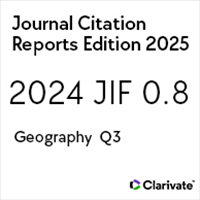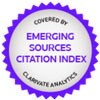Acerca de la teoría general de la racionalidad: lectura de la cultura, la religión y los comportamientos económicos
About general theory of rationality: A reading about culture, religion and economical components
https://doi.org/10.21670/ref.2011.23.a07
Palabras clave:
religión, cultura, valores, racionalidad, comportamientos económicosResumen
En este artículo discutimos acerca de la fecundidad explicativa de la teoría general de la racionalidad en lo que respecta a la influencia de la cultura y las creencias religiosas en los comportamientos económicos colectivos. Explicamos los conceptos y las categorías propios a esta escuela y ofrecemos bajo un enfoque metodológico comparativo ejemplos de aplicación y explicación, considerando en particular algunas metodologías opuestas de inspiración holista. Ponemos particular énfasis en las diferencias epistemológicas existentes dado que ambos paradigmas suscriben a concepciones distintas de la explicación sociológica y el conocimiento.Abstract In this article we argue about the explanatory productiveness of the general theory of rationality, respecting the influence of culture and religious beliefs in the collective economic behaviors. We explain the proper concepts and categories of this school and we offer under a methodological comparative outlook, examples about the application and explanation, particularly considering opposite methodologies of holistic inspiration. We put particular emphasis in the epistemological existing differences, due to the fact that both paradigms subscribe for different conceptions of sociological explanation and knowledge.
Citas
Alleton, Viviane (1993), Les Chinois et la passion des noms. Editions Aubier, París.
Arriaga, Rafael (2008), Religión, grupos étnicos y procesos de estratificación social: el caso de los mexicanos y chinos desde una perspectiva comparativa, 9, 17:107-147. DOI: https://doi.org/10.21670/ref.2008.17.a04
Bender, Steven W. (2003), Greasers and Gringos: Latinos, Law, and the American Imagination, NYU Press, Nueva York.
Boudon, Raymond (1977), Effets pervers et ordre social, PUF, París.
(1995), Le juste et le vrai. Etudes sur l’objectivité des valeurs et de la connaissance, Fayard, París.
(1998), Etudes sur les sociologues classiques, Presse Universitaire de France, París.
(2000), Etudes sur les sociologues classiques II, PUF, París.
(2001), “La rationalité du religieux, selon M. Weber”, L’année sociologique, 51, núm. 1, vol. 51.
(2003), Y a-t-il encore une sociologie?, Editions Odile Jacob, París.
(2003b), Raison, Bonnes raisons, Presse Universitaire de France, París.
(2004) Pourquoi les intellectuels n’aiment pas le libéralisme, Editions Odile Jacob, París.
(2006), Renouveler la démocratie. Eloge du sens commun, Editions Odille Jacob. París.
Bourdieu, Pierre y J.C. Passeron (1964), Les heritiers, les etudiants et la culture, Editions de Minuit, París. DOI: https://doi.org/10.1515/9783112319161
Bureau of the Census (2007), County and City Data Book, en
Campani, Giovanna, Francesco Carchedi, y Giovanni Mottura (1996), La crítica sociológica, abril-sept.
Cherkaoui, Mohamed (2000), “La stratégie des mécanismes générateurs comme logique de l’explication”, L’acteur et ses raisons. Melanges en l’honneur de Raymond Boudon, editado por Jean Baechler, François Chazel y Ramine Kamrane, Presse Universitaire de France, París.
Durkheim, Emile (1937), Les règles de la méthode sociologique, PUF, París.
Enzo Pace, Sabino Acquaviva (1994), La sociologie des religions, Editions Cerfs, París.
Gates, Hill (1996), China’s Motor: A Thousand Year of Petty Capitalism, Cornell University Press, Ithaca y Londres. DOI: https://doi.org/10.7591/9781501721618
Griffin, K. Albert (1991), Religious Proverbs, over 1600 Adages from 18 Faiths Worldide, Mac Farland and Company, Inc., Publishers., Jefferson, Londres.
Hovey, D. Joseph y R. Morales Lori (2006), “Religious Spiritual Beliefs: Fatalismo, in Yo Jackson”, Encyclopedia of Multicultural Psychology, Sage Publication Inc., Thousand Oaks, Londres y Nueva Deli.
Hung-Chao Tai (1989), “An Oriental Alternative?”, en Hung-Chao (ed.), Confucianism and Economic Development: An Oriental Alternative?, The Washington Institute Press, Washington, D.C.
Huntington, Samuel (1996), The Clash of Civilizations and the Remaking of World Order, Simon and Schuster, Nueva York.
_____ (2004), ¿Quienes somos?, Paidós, Barcelona.
Kitano, H., L. Harry y Roger Daniels (1995), Asian Americans Emerging Minorities, Englewood Cliffs, Prentice Hall Inc., Nueva Jersey.
Lewis, Oscar [1959], (1961), Antropología de la pobreza. Cinco familias, Fondo de Cultura Económica, México.
_____ [1961] (1980), Los Hijos de Sánchez. Autobiografia de una familia mexicana, Joaquin Mortiz, México.
_____(1968), A Study of Slum Culture: Backgrounds for la Vida, Randon House, Nueva York.
Light, Ivan y Carolyn Roseinstein (1995), Race, Ethnicity, and Entreprenuership in Urban America, Aldine de Gruter, Nueva York.
_____ y J. Steven (2000), Ethnic Economies, Academic Press, San Diego.
Maffesoli, Michel (1985), La connaissance ordinaire, París.
(2009), Apocalipse, Editions CNRS, París.
Marosi, Richard (2005), “Place Name Narrate Migrant’s Saga”, Los Angeles Times, mayo 10.
Mead, Margaret (1963), Moeurs et sexualité en Océanie, Plon, Terre Humaine, París.
Menkhoff, Thomas y Chalmer Labing Trading Network of Chinese entrepreneurs in Singapore.
Mirowsky, John y Catherine Rosse (1984), “Mexican Culture and its Emotional Contradictions”, Journal of Health and Social Behavior, 25, marzo. DOI: https://doi.org/10.2307/2136700
Peo, Yu (1936), Association de Credit Mutuel Rural et Associations Similaires en Chine (Ts’ing Houei), Les Editions Domat-Montchrestien, París.
Pew Hispanic Center (2009), Between two Worlds, how Young Latinos come of Age in America, diciembre, en http://pewhispanic.org/files/reports/117.pdf (consultado el 13 de enero de 2010).
Schwarcz, Bridge (1998), Across Broken Time. Chinese and Jewish Cultural Memory, Yale University Press, New Haven, 1998.
Simmel, Georg (1998), La religion, Editions Circé, París.
Valade, B. y R. Fillieule (1996), Introduction aux sciences sociales, PUF, París.
Velez-Ibáñez, G. Carlos (1983), Bonds of Mutual Trust. The Cultural Systems of Rotating
Credit Associations among Urban Mexicans and Chicanos, New Brunswick, Rugers
University Press.
Max Weber (1959), Le savant et le politique, Plon, París.
_____ (1964), Economia y sociedad, Fondo de Cultura Económica, México.
_____ (1967), L’hetique protestante et l’esprit du capitalisme, Plon, París.
_____ (1996), Introduction. Sociologie des religions, Gallimard, Bibliothèque de Sciences Humaines, París.
_____ (2000), Confucionisme et taoisme, Gallimard, Bibliothèque des Sciences Humaines, París.
Wong, P. Bernard (1982), Chinatown. Economic Adaptation and Ethnic Identity of the Chinese, Forth Worth, Holt, Rinehart and Winston, Inc.
Weightman, George H. ( 1982), “The Philippine Chinesse: From Aliens to Cultural Minority”, Journal of Social Science.































